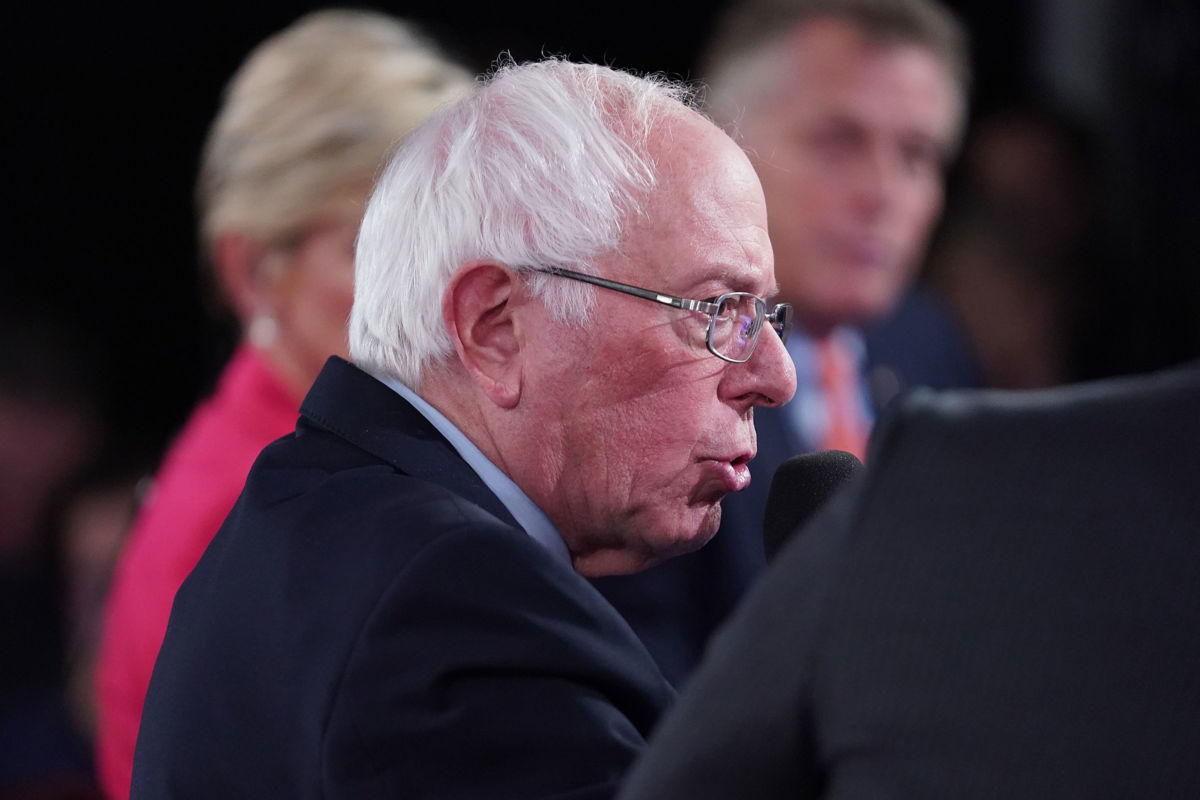It was “like clockwork.”
In the middle of a heated back-and-forth on Medicare for All at the beginning of Tuesday night’s Democratic presidential debate in Detroit, Sen. Bernie Sanders called out CNN for airing anti-single payer ads from the pharmaceutical and insurance industries during commercial breaks.
“By the way, the healthcare industry will be advertising tonight on this program,” Sanders said after accusing CNN moderator Jake Tapper of deploying “a Republican talking point” against Medicare for All. “They will be advertising tonight with that talking point.”
SANDERS earlier tonight: “By the way, by the way, the health care industry will be advertising tonight, on this program —”
TAPPER: “Thank you, senator”
SANDERS: “Oh, can I complete that please?” pic.twitter.com/KmsdPzwlWK
— Dan Diamond (@ddiamond) July 31, 2019
Sure enough, during the debate’s commercial breaks, ads by pharmaceutical giants and industry-backed organizations dominated the airwaves, further vindicating Sanders and other progressives who have raised alarm at the role corporate advertising plays in America’s media coverage.
As Variety reported last week, CNN — which is owned by AT&T — required “a commitment of $300,000 in advertising on the network before a potential sponsor can purchase commercials within the two debate telecasts.”
Bernie mentioned that the health care industry was running commercials during the CNN debate. He‘s right. Here’s a clip of the pharma “Go Boldly” campaign. pic.twitter.com/d4Fmb6JPVR
— Dan Diamond (@ddiamond) July 31, 2019
the ad break includes a commercial for a pill named "otezla" that partially clears skin at the cost of nausea, diarrhea and depression at a listed price of $3,400 for a 30-day supply. anyway back to asking candidates why they'd change our terrific health care system
— Christopher Hooks (@cd_hooks) July 31, 2019
The American Prospect’s David Dayen noted that, in addition to ads from the pharmaceutical lobby, the debate’s breaks also featured commercials from “the anti-single payer group Partnership for America’s Health Care Future (PAHCF), funded by hospitals and drug companies, and an Alzheimer’s disease patient advocacy group that takes major funding from drug companies.”
“The unfiltered 90 seconds of three of these commercials in succession comprised more screen time than anything in the debate about money in politics,” Dayen wrote. “The country cannot afford to have CNN creating the proscenium through which America gets informed.”
Pointing to the PAHCF commercial — which is part of a six-figure ad campaign against Medicare for All — Warren Gunnels, Sanders’s staff director, tweeted, “If Medicare for All was on trial, the entire corporate media would have to recuse itself for a y-u-g-e conflict of interest.”
CNN just aired this ridiculous tv ad paid for by the big health insurance & drug companies that make massive profits by denying Americans care. If #MedicareForAll was on trial, the entire corporate media would have to recuse itself for a y-u-g-e conflict of interest. #DemDebate
— Warren Gunnels (@GunnelsWarren) July 30, 2019
Sanders’s CNN call-out came at the tail end of the debate’s healthcare segment, which was largely driven by a question that progressives said disingenuously framed Medicare for All as a tax increase on the middle class, rather than a cost-saving overhaul of the nation’s broken healthcare system.
“Jake, your question is a Republican talking point,” Sanders told CNN’s Tapper.
The debate moderators were not the only ones accused of parroting right-wing attacks against Medicare for All Tuesday night.
After former Rep. John Delaney (D-Md.) called Medicare for All “bad policy” and suggested it would take healthcare away from millions of Americans — a line that was echoed by other right-wing Democratic candidates on the debate stage — Sen. Elizabeth Warren (D-Mass.) hit back.
“We are not about trying to take away healthcare from anyone. That’s what the Republicans are trying to do,” said Warren, a co-sponsor of Sanders’s Medicare for All bill in the Senate. “And we should stop using Republican talking points in order to talk with each other about how to best provide that healthcare.”
Our most important fundraising appeal of the year
December is the most critical time of year for Truthout, because our nonprofit news is funded almost entirely by individual donations from readers like you. So before you navigate away, we ask that you take just a second to support Truthout with a tax-deductible donation.
This year is a little different. We are up against a far-reaching, wide-scale attack on press freedom coming from the Trump administration. 2025 was a year of frightening censorship, news industry corporate consolidation, and worsening financial conditions for progressive nonprofits across the board.
We can only resist Trump’s agenda by cultivating a strong base of support. The right-wing mediasphere is funded comfortably by billionaire owners and venture capitalist philanthropists. At Truthout, we have you.
We’ve set an ambitious target for our year-end campaign — a goal of $250,000 to keep up our fight against authoritarianism in 2026. Please take a meaningful action in this fight: make a one-time or monthly donation to Truthout before December 31. If you have the means, please dig deep.
